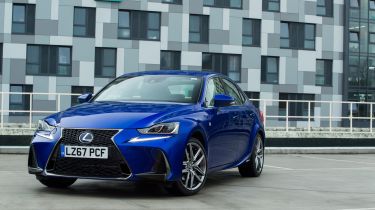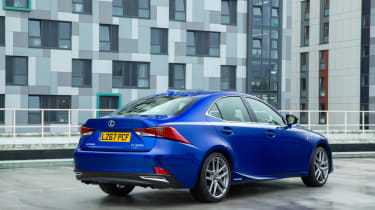Lexus IS 300h (2013-2020) review
The Lexus IS 300h is a compact executive saloon that was available exclusively with petrol-electric hybrid power

Pros
- Superb reliability record
- Cheaper company-car tax than diesel rivals
- Comfortable and refined
Cons
- Intrusive CVT gearbox
- Tricky infotainment system
- Disappointing fuel economy
| Car type | Fuel economy | CO2 emissions | 0-62mph |
|---|---|---|---|
| Hybrid | 45-49mpg | 133-144g/km | 8.4s |
This generation of the Lexus IS has now gone out of production, with the new IS expected to be unveiled later this year. The Lexus IS has been available in hybrid form since 2013 in the UK, with the previous generation’s electric-petrol “self-charging hybrid” powertrain featuring a punchy six-cylinder engine with a sporty, rear-wheel drive chassis.
The Lexus IS is the Japanese brand’s answer to the BMW 3 Series, Mercedes C-Class, and other compact executive saloons like the Volvo S60, but has never managed to overcome British drivers’ affinity for the established Swedish or German badges.
In the recent past, Lexus has tried to bolster the model's sporty pretensions with cars like the high-performance V8-powered IS F super-saloon, while at the same time offering diesel and hybrid-powered options to go after the lucrative company-car fleet market. And with European rivals continuing to excel in the high-performance sector, Lexus pulled its horns in to concentrate on its 'self-charging' hybrid powertrain message, where it has a longstanding advantage stemming from parent company Toyota’s industry-leading work with the Toyota Prius.
As it’s a 'self-charging' hybrid, the Lexus IS 300h has no plugs or cables, so owning one is a more straightforward proposition than running a plug-in hybrid (PHEV), which needs to be charged on a regular basis to get the most out of it. Compared to a PHEV or electric car, the Lexus hybrid system has much smaller batteries, which are charged by the car’s petrol engine; the downside is you only get a mile or so of electric-only motoring.
That means you can’t contemplate a petrol/diesel-free commute as you might with a PHEV, because the Lexus’ electric motor is designed to work primarily in concert with the petrol engine. Simply put, if the electric motor can do some of the work, the engine needs to burn less fuel for its share of the effort – reducing official MPG and tailpipe emission figures, while retaining sporty performance.
All the Lexus IS 300h models come with the same 2.5-litre petrol four-cylinder engine and electric motor combination, providing a combined maximum output of 220bhp. They’re all rear-wheel-drive and use a CVT transmission – a relatively unusual type of automatic gearbox that has distinctive driving characteristics, but which is said to be always optimised for greatest efficiency.
When new, the IS 300h was offered in a variety of trim levels, starting with the entry-level IS, then running through F Sport and the range-topping Takumi. All are comparatively well equipped as you’d expect from Lexus, and a variety of option packs were available.
A full safety package came as standard across the board, including adaptive cruise control, lane-keeping assistance and traffic-sign recognition, as well as 17-inch alloys, front and rear parking sensors, seven-inch sat nav, a six-speaker stereo and dual-zone air-conditioning.
The F Sport model adds sportier styling, sports-tuned suspension, eight-way power-adjustable seats, rain-sensing wipers, auto headlights and an auto-dimming rear-view mirror The Takumi features an upgraded navigation system with a 10.3-inch screen and 15-speaker audio, as well as 18-inch alloys, blind-spot monitoring, a reversing camera, ventilated front seats and a heated steering wheel.
On the road, the IS 300h is a rewarding drive, with plenty of grip and power. It doesn’t feel as lithe and agile as premium European rivals, though, and the CVT gearbox makes acceleration seem sluggish and strained – in spite of a 0-62mph time of 8.3 seconds. The cabin is practical, roomy and feels well put-together, although the hybrid batteries compromise boot space and the infotainment system is one of the worst in the class.
The Lexus hybrid’s official emissions figures mean it offers tax benefits compared to diesel rivals, and with its luxury and performance the IS 300h can be a rewarding choice. However, our experience suggests real-life consumption may be some way off the claimed figures, and the car isn’t clean enough to qualify for London Congestion Charge exemption or any government grants.
Plug-in hybrid alternatives like the BMW 330e and Volvo S60 T8 can potentially be much cheaper to run if you can charge them regularly, and we would also favour the newer Lexus ES over the IS for company car drivers. It's a bigger, better car that achieves lower emissions and so can be had for much the same BiK tax cost. For a more detailed look at the Lexus IS 300h, read on for the rest of our in-depth review...



